Liberians love rice. It is commonly said that if a Liberian hasn’t eaten rice today, he hasn’t eaten. The main meal of the day, usually taken around 10 or 11:00 am, consists of white rice (usually imported varieties) and “soup.” Soup is a generic term that refers to any gravy-like concoction that can be put over rice. There are several types of soup, the preparations of which are almost identical. A locally-grown vegetable forms the basis of the soup.
The main types of soup found around Liberia are as follows, in perceived order of popularity:
– Potato Greens (the non-poisonous sweet potato variety)
– Beans (often with small rocks intermixed; teeth beware!)
– Cassava Leaf (leaves ground to a dark green paste)
– Pepper Soup (the simplest and cheapest soup with no vegetable base)
– Palm Butter (a bubbling crude of red palm oil)
– Torbogee (using a special fermented palm oil paired with baking soda)
– Cabbage (day two can even taste like sauerkraut!)
– Palaver Sauce (made from a special “slippery” leaf, can be eaten in a Palaver Hut)
– Ground Pea (local peanut butter, easy to make and Ben’s favorite)
– Pumpkin (more akin to squash)
– Bitterball (small, slightly bitter relatives of the eggplant)
To cook Liberian, a standard formula can be followed. It all starts with hot, and I mean hot, peppers. The locally available variety is the Scotch Bonnet peppers. Look it up online, these are hundreds of times hotter than jalapeños. The peppers, along with onions, are beaten to a paste in a mortar. The heavy thumping of wooden mortars and pestles is one of the iconic sounds of West Africa.
The peppers and onions are fried in heavy oil with the main vegetable ingredient. Optionally, fish or meat is added. When the frying is complete, water, tomato paste, salt, and “Vita” are added. Vita is a popular brand of bullion cubes that contains a bit of flavor, salt, and MSG. Vita is a household name. (I’ve even seen Vita t-shirts.) The soup is cooked long and slow on a coal fire. The cook adds water and oil periodically to keep the soup from burning.
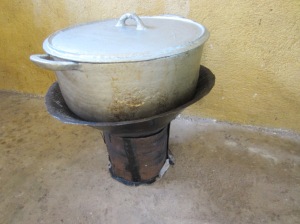
The rice and the soup arrive at the table in separate bowls, piled high in perfect mounds. Liberians like a lot of rice, and will ask the server to “make my bowl tip.” The diner then spoons the soup onto the rice little by little. The man of the house and honored guests eat from their own bowls. They also get the best pieces of meat and fish. Women and children eat separately from the men. Groups based on status and age eat family-style from a single large bowl. Family-style eating can be fast and furious, as each hungry human races to eat her fill. Everyone gets enough, but the fastest get a few extra heaping spoonfuls.
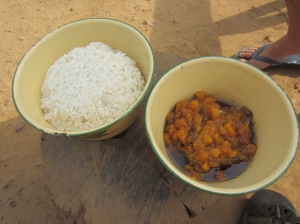
For a traveler newly-arrived to the country, Liberian food can “embarrass” the stomach. Many of the incoming volunteers experience difficulties as they adjust to a completely new dietary realm. The combination of seriously hot peppers and copious amounts of oil can cause a host of digestive issues, most of which are named on a bottle of Pepto Bismol. Furthermore, the meat included with the meal is often unidentifiable or dubious. Fish is usually dried and aptly named “Bony.” With chicken and pork, only the feet make it to the table. Meat is usually “bush meat,” which represents whatever animal was available in the market that day. Groundhog, snail, bat, and even monkey are not exempt.
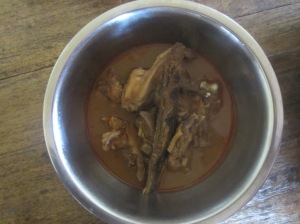
One word of advice: when you receive your first bowl of savory Liberian vittles, resist the temptation of bringing it to your nose to smell it. The gesture of smelling is viewed as checking whether or not the food has spoiled. Liberians will take this as an insult. Instead, enjoy the flavors and aromas as you eat. Keep your hosts happy, and keep your nose out of it!
Coming from the West, Liberian foods takes some getting used to. New flavors, textures, spiciness, oiliness, and unusual cuts of meat can pose a challenge to those with a “skinless, boneless, reduced fat” background. With time, though, most people really enjoy the food. After a while, they even crave it. Maybe that’s the MSG. More likely it’s just good, time-tested, Liberian home-cooking.
Liberian Ground Pea Soup Recipe
This soup uses “ground pea” (peanut) butter and is one of the easiest Liberian soups to make. It is hearty and delicious and isn’t strange to a western palate. It may be a bit spicy, depending on the variety of peppers used, so you may want to reduce the peppers the first time. Oh, and wash your hands well after handling the peppers. Enjoy!
– ¼ cup hot peppers (Scotch Bonnet, Habañero, or Birds’ Eye varieties)
– 1 small onion, chopped
– ½ cup natural peanut butter
– 1 Vita cube, or chicken bullion cube
– 2 Tbsp vegetable, peanut, or palm oil
– 1/8 cup tomato paste
– 1/8 tsp salt
– 1-2 cups water
– 8 oz. meat of your choice: Fresh fish, canned tuna, chicken, beef, pork, bush meat
– 3 cups white rice, prepared
If using fresh fish or meat, fry the meat in the oil in a skillet. Cook the rice separately. Beat peppers and onion in a mortar (or puree in food processor). When the meat is done, remove it from the skillet and set aside. Fry the onion and pepper in the same oil. When onions are translucent, add the peanut butter, tomato paste, and bullion. Add water until a gravy-like consistency is reached. Simmer the soup for 10 minutes. Add the meat or fish back into the mixture. Simmer for another 5-10 minutes. Add salt to taste. Serve over rice. Let’s eat-o!

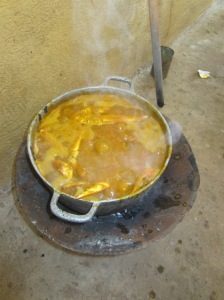
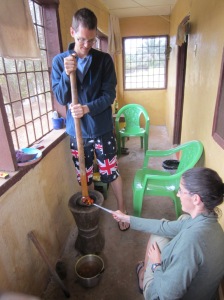
I showed this to some of my students. It generated a lot of questions about Africa, which kids are studying in Social Studies. I also showed them and read to them the blog about video games. This soup blog makes me hungry for some of the food we ate while we were there. I hope there will be U.S. versions of some of these once you return. Love, Mom/Marg
Chicken and rice with palm butter is nice… Liberian song, not to mention one of my favorites. Collards were big in Gbarnga when I was there. Bitter balls I did not like. Still cook chop on a regular basis. –Curt
Great, that is good. Thanks for liking Liberian food and thanking you for serving the liberian people. We really appreciate that. Right now, the world is seeing Liberia only for Ebola. That will come to pass. We will enjoy Liberia again.